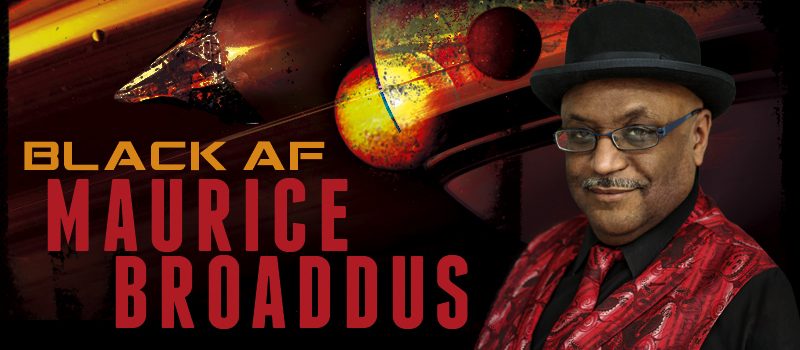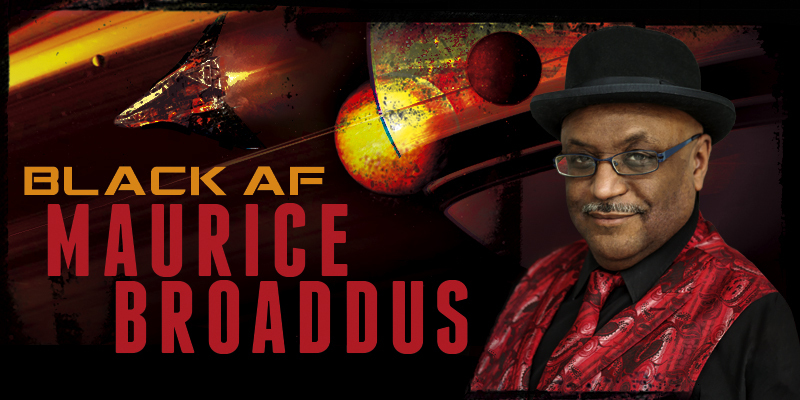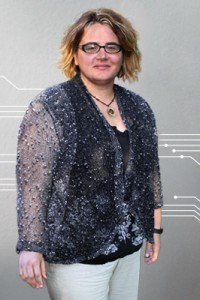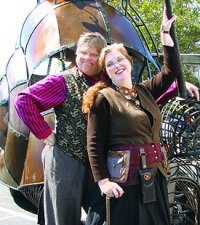Maurice Broaddus: Black AF
Maurice Gerald Broaddus was born April 30, 1970 in London, England, but moved to Indiana at age six. He grew up in Indianapolis, where he still resides with his wife and two sons and works as a middle-school teacher.
Broaddus began publishing genre work with “Since We Can Die but Once” (2006). Though he mostly wrote horror to start, he has since expanded into urban fantasy, alternate history, and science fiction. His story “Pimp My Airship” (2009) was expanded into novel Pimp My Airship (2019), and novella Buffalo Soldier (2017) is set in the same universe. He co-wrote Orgy of Souls with Wrath James White (2010). The Knights of Breton Court series includes King Maker (2010), King’s Justice (2011), and King’s War (2011). His first middle-grade novel, The Usual Suspects, appeared in 2019, with sequel Unfadeable forthcoming this year.
Shorter work includes novellas Devil’s Marionette (2009),
Bleed with Me (2011), and I Can Transform You (2010). Some of his stories are collected in The Voice of Martyrs (2016). He edited anthologies Dark Faith (2010) and Dark Faith: Invocations (2012), both with Jerry Gordon. They also co-edited supernatural noir anthology Streets of Shadows (2014).
Broaddus’s newest project is the Afrofuturist space opera Astra Black series, beginning with Sweep of Stars, out in April 2022.
Excerpt from the interview:
“When we moved to Indianapolis, we were like the first Black family to move into our neighborhood, and I was put into this all-white school program. I was in that program from fifth grade through my high school senior year, and I went to an all-white church on top of that. Speaking of cultural dissonance, that was a whole lot of why I felt cut off from my own people in so many ways. That, again, is probably why this theme of searching for identity is present in a lot of my work. Once I graduated high school, I kept asking myself questions like, ‘Man, what does it even mean to be Black? What does that look like?’ I went on a whole journey because of that – a journey I’m still on in a lot of ways. I’m still trying to figure it out.
“My fiction is about working through those questions –pretty intentionally, now that I think about it. A lot of my fiction is me asking questions about myself, questions that I’m wrestling with, that sort of thing. I tend to write from a pretty personal, vulnerable space. Just raw. I’m exposed out there.
“I’ve been writing for over 20 years now. It looked a lot different for me back then, as opposed to now, obviously. It’s all journeys in a lot of ways – everything is about the journey. I was trying to figure out what my voice was at the beginning. I was like, ‘I’m Black, I’m a person of faith, I’m a scientist, what does all that mean?’ I was asking myself these sorts of questions, and these are the sorts of questions that start coming out of my work, this sort of mix of all these different elements, but I was still trying to figure out what that meant. When I started submitting my work, I was still in this space of trying to fit in, because that’s how I was in school, going back all the way to Franklin.
“The first thing me and my brother did was, we purposely lost our accents so that we could try to fit in better. I was going through the school system, just trying to fit in better. By the time I entered publishing, my instinct was still just trying to fit in better. What does it take for me to fit in, and for people to accept my fiction? Should I take the edges off of my characters, as some editors tried to pressure me into doing? Maybe that was the route for me. So at the beginning of my journey, it was a lot about making myself smaller in order to fit in.
“Move forward 20 years and it’s like, ‘Ah, you know what, this is who I am.’ In fact, I was just telling a student earlier today, ‘Be big. Take up as much space as you can. Be loud. Don’t let anyone take that from you.’ Don’t let anyone diminish you. That’s where I’m writing now. I am loud. I will take up space. This is who I am.
“There’s incremental growth, but it boils down to supportive communities. I started surrounding myself with more and more supportive communities. Sometimes that meant I had friends who were constantly encouraging me along the way – Chesya Burke comes to mind; she’s one of my closest friends. When people bump into us at conventions, they’re like, ‘Are you two related?’ They’re trying to figure out our relationship, because we are literally bickering at all times. Chesya is one of my best friends, but what that means is she holds me to account. She’s like, ‘Hey, Maurice, I know the person you say you are and say you want to be – I’ma hold you to account for that.’ I’ve always tried to surround myself with community that holds me to account like that.
“I know that writing-wise, one of the big turning points for me was my novel Pimp My Airship. I came up in the horror community, and my first novel was King Maker in 2010. I had some novellas that had come out by then, and the novella I wrote with Wrath James White, so I was firmly cemented in that horror community. When I was writing King Maker, I thought that was just another horror novel, but they were like, ‘Nope, this is urban fantasy.’ Oh, I guess I’m an urban fantasy writer now. I didn’t know that term – I was in the horror circle, so when they told me I was an urban fantasy writer, I thought that was code for, ‘Black fantasy writer,’ because when you say ‘urban radio,’ that’s code for Black radio. So when I heard urban fantasy, I thought, ‘Oh, I’m in the perfect genre for me.’ Why didn’t I find it before? Then there was that rude awakening – that’s not what it means.
“Anyway, I was coming up through the ranks of horror, and I was aware of the reputation I enjoyed in community and everything, but I started writing Pimp My Airship, and I knew that was going to be a turning point. I made it halfway through that novel and thought, ‘I may want to put this one down, because in order to do the novel the way I want to, I’m going to have to double down on a lot of things about my identity and who I am.’ That book was going to be Black as fuck – there was no two ways about it, that’s what it was going to be. That made me really nervous, because I was putting a lot of my frankly militant politics into this, my voice, my passions, my vision, all this stuff I was channeling into this book. I was writing it from a personal space, and I was asking myself some very personal questions about my work as an artist in a community and everything like that. I was like, ‘I don’t know if I’m going to do this.’ Then I had a conversation with Daniel José Older. We were talking, and I was laying out my angst and everything about questions I was asking, and there was this pause, and he said, ‘Man, you need to do that shit.’ He went on this rant about what it means to be an artist and what it means to speak truth to power and what it means to be authentic and fully present and fully yourself in your work and just engage with no fucks given, essentially. I was like, ‘You know what, you’re right. I’m just going to be all in with this.’ And so I was. I was all in. The process of writing that book was a watershed moment for me, because ever since then I’ve just been like, ‘I’m going to be fully me at all times. I’m not going to worry about other people’s gaze or what they think about me. I’m just going to be me.’
Interview design by Francesca Myman.
Read the full interview in the March 2022 issue of Locus.
 While you are here, please take a moment to support Locus with a one-time or recurring donation. We rely on reader donations to keep the magazine and site going, and would like to keep the site paywall free, but WE NEED YOUR FINANCIAL SUPPORT to continue quality coverage of the science fiction and fantasy field.
While you are here, please take a moment to support Locus with a one-time or recurring donation. We rely on reader donations to keep the magazine and site going, and would like to keep the site paywall free, but WE NEED YOUR FINANCIAL SUPPORT to continue quality coverage of the science fiction and fantasy field.
©Locus Magazine. Copyrighted material may not be republished without permission of LSFF.









